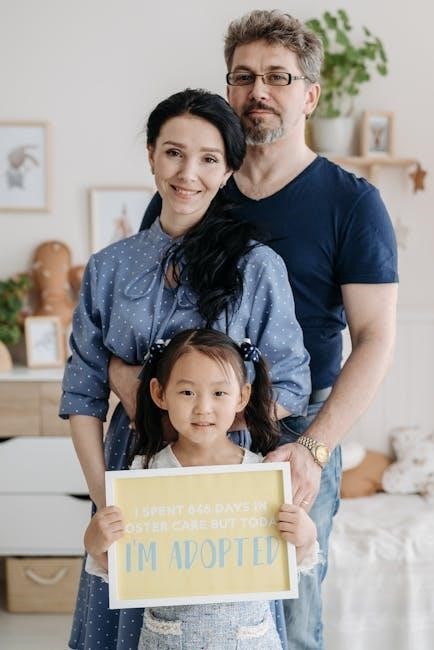Emotionally immature parents often struggle to provide emotional support, leaving their children with unresolved anxiety, depression, and relationship challenges. Lindsay C. Gibson’s work highlights how such parenting creates a landscape of neglect, forcing children to grow up too quickly and carry unmet emotional needs into adulthood. Her insights offer a pathway to healing and self-awareness for adult children seeking to break free from the cycle of emotional unavailability.
Definition and Characteristics of Emotionally Immature Parents
Emotionally immature parents often lack empathy, prioritizing their own needs over their children’s emotional well-being. They may appear self-focused, dismissive, or overly critical, leaving their children feeling unheard and invalidated. These parents struggle with self-regulation, often reacting impulsively or emotionally unavailable. Their behavior can create a sense of neglect, forcing children to grow up too quickly. Lindsay C. Gibson describes such parents as emotionally unavailable, highlighting how their immaturity leads to unmet emotional needs and long-term challenges for their adult children.
The Impact of Emotionally Immature Parents on Adult Children
Adult children of emotionally immature parents often experience lasting emotional and psychological effects. They may struggle with anxiety, depression, and difficulty forming healthy relationships due to unmet emotional needs. Feelings of anger, loneliness, and betrayal can persist, impacting self-worth and trust in others. These challenges stem from a childhood marked by neglect and forced maturity, leaving adult children to grapple with emotional unavailability and its ripple effects on their personal and professional lives.
Understanding the Types of Emotionally Immature Parents
Emotionally immature parents often exhibit specific patterns, such as emotional unavailability or self-involvement, which deeply impact their children. Lindsay C. Gibson identifies these patterns, helping adults recognize and address the root causes of their emotional struggles, fostering healing and self-awareness.
The Four Types of Emotionally Immature Parents
Dr. Lindsay C. Gibson identifies four types of emotionally immature parents: emotional, driven, passive, and rejecting. Each type exhibits distinct patterns, such as emotional unavailability or over-involvement, impacting children uniquely. Emotional parents seek validation, driven parents prioritize achievement, passive parents avoid conflict, and rejecting parents dismiss emotional needs. Understanding these types helps adult children recognize childhood dynamics and address unresolved emotional wounds, fostering personal growth and healthier relationships. Gibson’s insights provide clarity and a pathway to healing.
How Each Type Affects Adult Children Differently

Each type of emotionally immature parent impacts adult children uniquely. Emotional parents may lead to emotional dysregulation, while driven parents foster self-worth tied to achievement. Passive parents often result in difficulty asserting needs, and rejecting parents may cause fear of intimacy. These patterns, as explored by Lindsay C. Gibson, leave lasting scars, such as anxiety, loneliness, or relationship challenges. Recognizing these effects is crucial for adult children to address unresolved wounds and develop healthier emotional and relational strategies.

Common Challenges Faced by Adult Children
Adult children of emotionally immature parents often face emotional turmoil, unmet needs, and challenges in personal relationships, stemming from neglect and forced maturity during childhood.
Emotional and Psychological Effects
Adult children of emotionally immature parents often experience lingering feelings of anger, loneliness, and betrayal. These emotions stem from unmet childhood needs, leading to anxiety, depression, and self-doubt. The absence of emotional support can result in difficulty trusting others and forming healthy relationships. Many struggle with self-worth, feeling unheard or invalidated, which can persist into adulthood and affect their ability to cope with stress and maintain emotional balance. These effects highlight the profound impact of emotionally immature parenting on long-term mental health.
Struggles in Personal and Professional Relationships
Adult children of emotionally immature parents often face challenges in relationships, struggling with trust, communication, and boundary-setting. They may experience fear of abandonment or people-pleasing behaviors, stemming from childhood patterns of seeking validation. In professional settings, difficulties in asserting needs or navigating conflict can arise. These struggles highlight the lasting impact of emotionally immature parenting on interpersonal dynamics, emphasizing the need for self-awareness and healing to foster healthier connections in both personal and professional realms.

The Role of Self-Awareness in Healing
Self-awareness is crucial for healing, enabling adult children to recognize childhood patterns and develop emotional intelligence, fostering personal growth and healthier relationships.
Recognizing Patterns from Childhood
Recognizing childhood patterns is essential for healing, as it helps adult children identify how emotionally immature parents influenced their emotional development. By acknowledging the emotional unavailability or selfishness of their parents, individuals can understand the root of their anxiety, depression, or relationship struggles. This self-awareness allows them to break free from unhealthy dynamics and take responsibility for their own emotional well-being, fostering personal growth and healthier relationships in adulthood.
Developing Emotional Intelligence
Developing emotional intelligence is crucial for adult children of emotionally immature parents, as it helps them recognize and manage their emotions effectively. This involves practicing self-awareness, empathy, and healthy communication. By understanding their emotional needs and learning to respond rather than react, individuals can break free from harmful patterns. Lindsay C. Gibson emphasizes the importance of self-reflection and mindfulness in building emotional resilience, enabling adult children to foster healthier relationships and achieve emotional balance in their lives.
Reparenting Yourself: A Path to Healing
Reparenting involves nurturing your inner child to fill emotional gaps left by immature parents. It fosters self-compassion, healing, and personal growth, helping adults reclaim their emotional well-being.
What Reparenting Means for Adult Children
Reparenting is a transformative process where adult children nurture their inner child to heal from emotional neglect. It involves self-compassion, setting boundaries, and reclaiming emotional well-being. By addressing unmet needs, adults create a healthier relationship with themselves, fostering resilience and self-awareness. This journey empowers individuals to break free from past patterns and develop a stronger sense of self, ultimately leading to personal growth and emotional freedom.
Practical Steps to Reparent Yourself
Reparenting involves actively addressing unmet childhood needs. Start by identifying emotional deficits and practicing self-compassion. Set healthy boundaries with others to protect your well-being. Engage in mindfulness to recognize and validate your feelings. Challenge negative self-talk and reframe past experiences. Seek supportive relationships and consider therapy for guidance. Prioritize self-care activities that bring joy and comfort, fostering a nurturing relationship with yourself. Consistency and patience are key to rebuilding emotional resilience and independence.

Setting Boundaries with Emotionally Immature Parents
Lindsay C. Gibson emphasizes that setting boundaries is crucial for protecting your emotional well-being. Boundaries help establish limits on toxic behaviors and promote healthier interactions, fostering emotional distance and self-respect while allowing you to reclaim control over your life and relationships.
Why Boundaries Are Essential
Boundaries are vital for adult children of emotionally immature parents to protect their emotional well-being. They prevent toxic patterns from continuing and create space for healthier interactions. By setting limits, individuals can detach from their parents’ immaturity, reducing emotional turmoil and fostering self-respect. Boundaries also help clarify responsibilities, ensuring adult children are not overly enmeshed in their parents’ lives. This separation is crucial for personal growth and maintaining mental health, allowing individuals to develop a sense of identity and independence.
How to Communicate Boundaries Effectively
Communicating boundaries with emotionally immature parents requires clarity and assertiveness. Start by identifying your limits and expressing them calmly using “I” statements, such as “I feel overwhelmed when…” Avoid blaming or attacking, which can escalate tensions. Set specific, measurable expectations and remain consistent, even if they resist. Offer alternatives, like “I’m happy to discuss this if we can keep the conversation respectful.” Reinforce boundaries gently but firmly, showing you’re serious about protecting your emotional well-being.

Lindsay C. Gibson’s Approach to Healing
Lindsay C. Gibson’s approach, as a clinical psychologist, focuses on reparenting and emotional intelligence, offering compassionate guidance for adults to heal from emotionally immature parents.
Overview of Lindsay C. Gibson’s Work
Lindsay C. Gibson, a clinical psychologist with over 30 years of experience, specializes in helping adult children of emotionally immature parents. Her New York Times bestseller, Adult Children of Emotionally Immature Parents, offers a comprehensive guide to understanding the long-term effects of such parenting. Gibson’s work emphasizes the importance of self-awareness, emotional intelligence, and reparenting oneself to heal from childhood wounds. Her approach is compassionate and practical, providing tools for adults to break free from patterns of anxiety, depression, and relationship struggles rooted in their upbringing.
Key Concepts from “Adult Children of Emotionally Immature Parents”
Lindsay C. Gibson’s work identifies key patterns of emotionally immature parenting, such as emotional unavailability, self-involvement, and a lack of empathy. She emphasizes the concept of “reparenting oneself” to address unmet childhood needs. Gibson also highlights the importance of developing emotional intelligence and setting healthy boundaries. Her approach encourages self-compassion and understanding of how these parenting styles shape adult relationships and behaviors. The book provides practical strategies for healing and breaking free from the legacy of emotional immaturity.
The Importance of Support Systems
Therapy and support networks play a vital role in healing, offering understanding and practical advice for adult children to navigate emotional challenges and rebuild their lives effectively.
Role of Therapy in Healing
Therapy provides a safe space for adult children to process childhood experiences and develop emotional resilience. Lindsay C. Gibson emphasizes that therapy helps individuals recognize patterns of emotional unavailability and develop healthier coping mechanisms. Through guided self-reflection, therapy offers tools to rebuild self-esteem and establish boundaries. It also fosters a deeper understanding of parental behavior, enabling adults to break free from cycles of anxiety and depression. Professional support is crucial for healing and reclaiming emotional well-being.
Building a Support Network
Building a support network is vital for adult children of emotionally immature parents. Connecting with others who share similar experiences fosters understanding and validation. Lindsay C. Gibson highlights the importance of community and shared healing. Support groups, both online and in-person, provide a space to exchange stories and strategies. These networks help individuals move beyond isolation, offering practical advice and emotional validation. They also remind adults that they are not alone in their journey toward healing and self-discovery.
Self-Care for Adult Children
Self-care is essential for adult children of emotionally immature parents. Practices like mindfulness, exercise, and setting boundaries help restore emotional balance and foster personal growth, as emphasized by Lindsay C. Gibson.
Physical and Emotional Self-Care Practices

Engaging in regular exercise, mindfulness, and meditation can help adult children heal from emotionally immature parenting. Journaling and creative activities foster emotional expression and self-awareness. Prioritizing sleep, nutrition, and relaxation techniques supports overall well-being. Setting boundaries and seeking supportive relationships are also crucial. These practices help restore emotional balance, reduce stress, and promote resilience, enabling individuals to reclaim their emotional health and live more fulfilling lives. Self-care is a powerful tool for long-term healing and personal growth.
Importance of Mindfulness and Meditation
Mindfulness and meditation are essential tools for adult children of emotionally immature parents, helping them manage stress and anxiety. These practices foster self-awareness, allowing individuals to recognize and process unresolved emotions. By cultivating present-moment focus, mindfulness reduces reactivity to triggers tied to childhood experiences. Regular meditation also enhances emotional regulation, promoting inner peace and resilience. Lindsay C. Gibson emphasizes these practices as part of a holistic approach to healing, empowering individuals to break free from the cycle of emotional immaturity and embrace personal growth.

Healing from Distant, Rejecting, or Self-Involved Parents
Healing from emotionally immature parents involves understanding their limitations and developing self-compassion. Lindsay C. Gibson’s insights help adults address lingering feelings of abandonment and betrayal, fostering emotional recovery.
Understanding the Root Causes of Parental Behavior
Emotionally immature parents often struggle due to unresolved issues from their own upbringing, leading to emotional unavailability. Their behavior stems from a lack of empathy and self-awareness, rooted in childhood experiences. This cycle of neglect forces adult children to confront unmet emotional needs and develop strategies for healing. Recognizing these patterns is crucial for breaking free from the impact of distant or self-involved parenting.
Strategies for Emotional Recovery
Emotional recovery involves acknowledging past wounds and developing self-compassion. Practical steps include setting boundaries, practicing mindfulness, and engaging in therapy to process unresolved emotions. Reparenting oneself by meeting unmet childhood needs is essential. Building emotional intelligence and fostering healthy relationships can counteract the effects of emotionally immature parenting. These strategies, as outlined by Lindsay C. Gibson, empower adult children to heal and create a more fulfilling life, breaking the cycle of emotional unavailability.

Real-Life Stories and Case Studies
Real-life stories and case studies reveal common struggles of adult children, offering validation and insights into healing from emotionally immature parenting, while fostering a sense of community and shared growth;
Common Narratives from Adult Children
Adult children of emotionally immature parents often share stories of feeling unseen, unheard, and unsupported. Many express lingering feelings of abandonment, self-doubt, and difficulty trusting others. Lindsay C. Gibson’s work highlights these common narratives, emphasizing how emotionally unavailability in childhood can lead to anxiety, depression, and relationship challenges in adulthood. These shared experiences validate individual struggles and provide a foundation for understanding the long-term effects of emotionally immature parenting, fostering connection and hope for healing among those who relate to these stories.
Lessons Learned from Shared Experiences
Shared experiences among adult children reveal common patterns of emotional unavailability and its profound effects. Many learn that their struggles are not unique, fostering a sense of validation and connection. These narratives highlight the importance of self-awareness and the need to break free from cycles of neglect. By understanding these shared lessons, individuals can begin to heal and develop healthier relationships, ultimately reclaiming their emotional well-being and fostering personal growth.
Moving Forward: Breaking the Cycle
Breaking the cycle involves transforming childhood pain into strength, fostering self-awareness, and creating healthier relationships. It’s about reclaiming your emotional well-being and building a brighter future.
How to Avoid Passing on Emotional Immaturity
To break the cycle, focus on self-awareness, emotional intelligence, and healthy communication. Practice mindfulness, seek therapy, and model positive behaviors for your children. Teach empathy, validate emotions, and encourage open dialogue. By addressing your own unmet needs and developing emotional resilience, you create a nurturing environment that fosters healthy relationships and prevents the repetition of emotional immaturity in future generations.
Creating a Healthier Family Dynamic
Building a healthier family dynamic involves modeling emotional intelligence, fostering open communication, and prioritizing empathy. Encourage mutual respect, active listening, and validation of emotions. Teach problem-solving skills and promote independence while offering support. By breaking free from past patterns and embracing mindfulness, you create a nurturing environment where emotional needs are met, and relationships thrive. This shift not only benefits your children but also helps you heal and grow as an individual.
Healing from emotionally immature parents is a journey of self-discovery and growth. By embracing self-awareness, reparenting, and support, adult children can break free from past wounds and thrive, creating a brighter, healthier future for themselves and their families.
Summarizing the Journey to Healing
The journey to healing for adult children of emotionally immature parents involves acknowledging the past, embracing self-awareness, and reparenting oneself. Lindsay C. Gibson’s work emphasizes the importance of breaking free from emotional unavailability and developing healthier relationships. By setting boundaries, practicing self-care, and seeking support, individuals can overcome lingering wounds and foster personal growth. This path requires courage but leads to empowerment, allowing adults to create a more fulfilling and authentic life, free from the shadows of childhood neglect.
Encouragement for Continued Growth
Healing from emotionally immature parenting is a journey of self-discovery and empowerment. Embrace your resilience and recognize the strength it takes to confront past wounds; Prioritize self-care, seek supportive relationships, and celebrate small victories along the way. Remember, you deserve a life filled with emotional fulfillment and authenticity. Lindsay C. Gibson’s guidance reminds us that growth is possible, and a brighter, more compassionate future awaits. Keep moving forward with courage and kindness toward yourself.
Additional Resources for Further Reading
Adult Children of Emotionally Immature Parents by Lindsay C. Gibson is a New York Times bestseller, offering profound insights and practical advice. Available on Amazon, Rakuten Kobo, and more, it’s a must-read for healing. Explore online communities and support groups for further connection and shared experiences, aiding your journey toward emotional recovery and growth.
Recommended Books and Articles
Adult Children of Emotionally Immature Parents by Lindsay C. Gibson is a New York Times bestseller, offering guidance for healing from emotionally unavailable parents. Available on Amazon, Rakuten Kobo, and more, it’s a must-read for understanding and overcoming childhood emotional neglect. Additionally, her book Self-Care for Adult Children of Emotionally Immature Parents provides loving advice for reparenting oneself. Online articles and blogs on platforms like Psychology Today also offer valuable insights and strategies for emotional recovery.
Online Communities and Support Groups
Online communities and support groups offer a safe space for adult children of emotionally immature parents to share experiences and heal. Platforms like Facebook groups, Reddit forums, and specialized mental health websites provide connection and understanding. Many groups discuss Lindsay C. Gibson’s insights and strategies, offering practical advice and emotional support. These communities foster a sense of belonging and empowerment, helping individuals navigate their journey toward recovery and self-awareness.